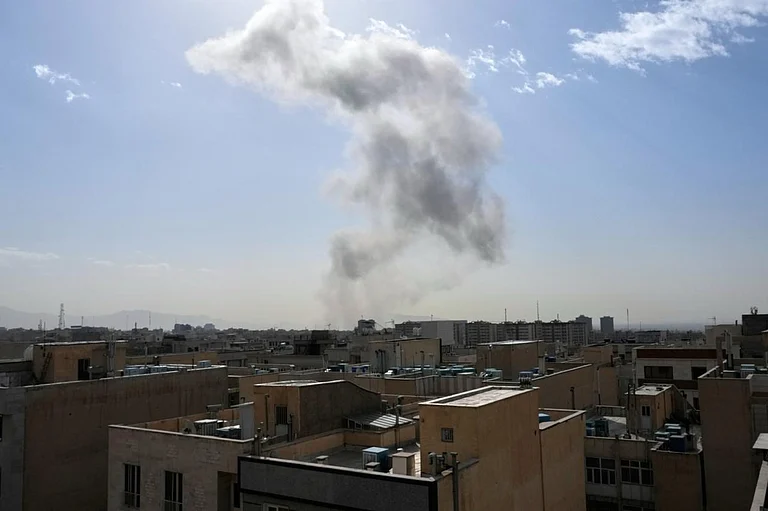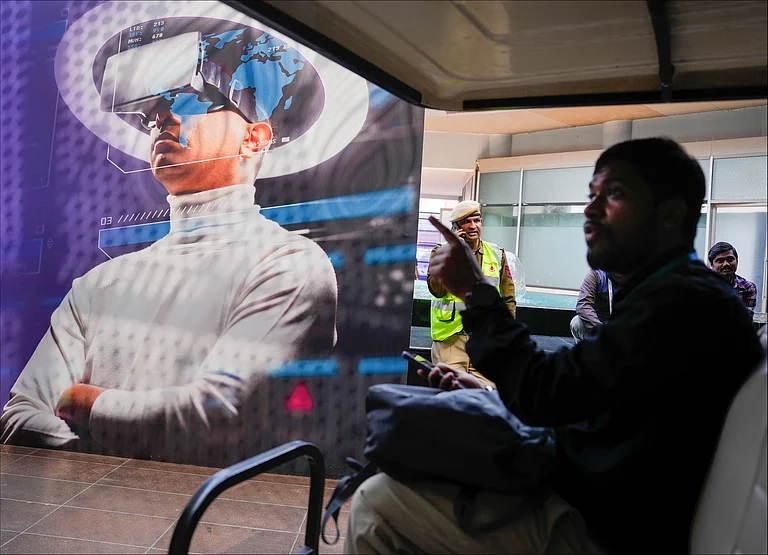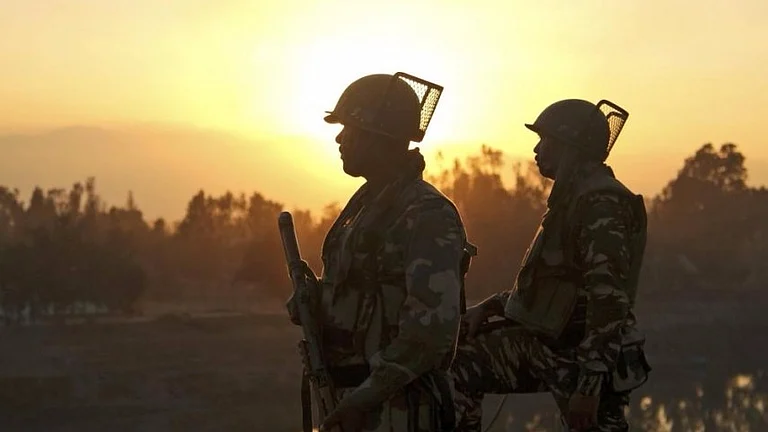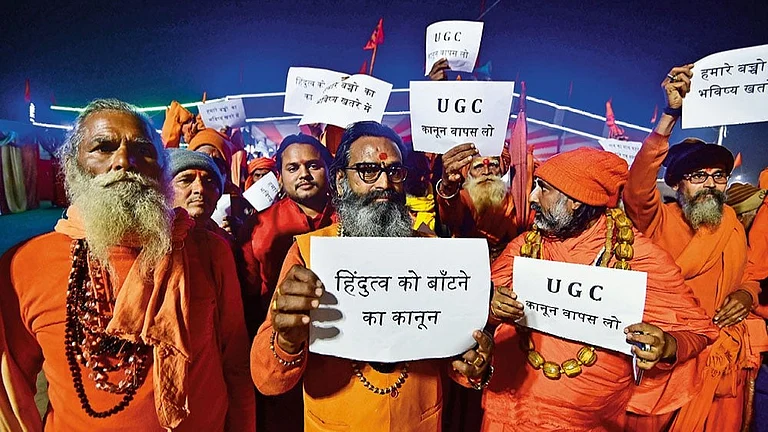Over five years after one of the deadliest terror attack on a CRPF convoy in Jammu and Kashmir's Pulwama district, a 32-year-old man accused in the case died of a hear attack in the Government Medical College Hospital in Jammu.
Bilal Ahmad Kuchey was among 19 persons formally charged by the National Investigation Agency (NIA) in the incident which claimed the lives of 40 soldiers on February 14, 2019.
Kuchey, who was hospitalised on September 17 after falling sick at the Kishtwar district jail, died of heart attack on Monday night, officials said. He was among seven of the 19 accused who were arrested in the case.
The charge sheet was filed under various sections of the Ranbir Penal Code, Arms Act, Unlawful Activities (Prevention) Act, Foreigners Act and the J&K Public Property (Prevention of Damages) Act.
What Happened In Pulwama In 2019?
A suicide bomber of the Pakistan-based Jaish-e-Mohammad (JeM) rammed an explosive-laden car into a CRPF convoy in Pulwama's Lethpora on February 14, 2019 on the Srinagar-Jammu National Highway. The incident killed 40 soldiers and injured eight others, leaving a deep dent on the nation.
Led by Masood Azhar, JeM is headquartered in Bahawalpur and has been active in Pakistan for more than two decades.
The attack was carried out by a 21-year-old Adil Ahmad Dar. In his last pre-recorded video, which was released by JeM after the attack, Dar said, "By the time this video reaches you, I will be enjoying heaven... This is my last message to the people of Kashmir."
Over five years after one of the deadliest terror attack on a CRPF convoy in Jammu and Kashmir's Pulwama district, a 32-year-old man accused in the case died of a hear attack in the Government Medical College Hospital in Jammu.
Bilal Ahmad Kuchey was among 19 persons formally charged by the National Investigation Agency (NIA) in the incident which claimed the lives of 40 soldiers on February 14, 2019.
Kuchey, who was hospitalised on September 17 after falling sick at the Kishtwar district jail, died of heart attack on Monday night, officials said. He was among seven of the 19 accused who were arrested in the case.
The charge sheet was filed under various sections of the Ranbir Penal Code, Arms Act, Unlawful Activities (Prevention) Act, Foreigners Act and the J&K Public Property (Prevention of Damages) Act.
What Happened In Pulwama In 2019?
A suicide bomber of the Pakistan-based Jaish-e-Mohammad (JeM) rammed an explosive-laden car into a CRPF convoy in Pulwama's Lethpora on February 14, 2019 on the Srinagar-Jammu National Highway. The incident killed 40 soldiers and injured eight others, leaving a deep dent on the nation.
Led by Masood Azhar, JeM is headquartered in Bahawalpur and has been active in Pakistan for more than two decades.
The attack was carried out by a 21-year-old Adil Ahmad Dar. In his last pre-recorded video, which was released by JeM after the attack, Dar said, "By the time this video reaches you, I will be enjoying heaven... This is my last message to the people of Kashmir."
A sawmill worker, Dar was recruited to Jaish's fidayeen(suicide) squad. He left his home on March 19, 2018, and never came back home. Days later, he posted a picture of himself on social media, holding an AK-47 rifle, and called himself "Waqas Commando".
JeM, which is proscribed by the United Nations, has been responsible for a series of terror attacks including the December 2001 one on the Indian Parliament and the Pathankot airbase in January 2016.
India-Pak Relations & Surgical Strike
The attack sent the already-hit India-Pakistan relations to a new low as Jaish claimed responsibility for it.
In the aftermath, the Indian Air Force -- in an intelligence-led operation -- struck the biggest training camp of JeM in Balakot in the early hours of February 26, 2019. Several JeM terrorists, trainers, senior commanders and groups of jihadis who were undergoing training for fidayeen action were killed in the strike.
India's intelligence-led strike at this facility in Balakot was reflection of New Delhi's stand that it won't tolerate any such provocation. The Balakot JeM camp was headed by Masood Azhar's brother-in-law Maulana Yousuf Azhar alias Ustad Ghouri.
Releasing a statement hours later, the Indian Government said that it is firmly and resolutely committed to taking all necessary measures to fight the menace of terrorism. "Hence this non-military preemptive action was specifically targeted at the JeM camp. The selection of the target was also conditioned by our desire to avoid civilian casualities. The facility is located in thick forest on a hilltop far away from any civilian presence."
Noting that Pakistan had made a solemn commitment to not allow its soil or territory to be used for terrorism against India, New Delhi said that it expects that Pakistan will live up to its public commitment and take follow up actions to dismantle all JeM and other camps, holding terrorists accountable for the actions.
NIA's Probe & The Case
According to the National Investigation Agency (NIA), the Pulwama terror attack was the result of a well-planned criminal conspiracy hatched by the Pakistan-based leadership of the JeM.
It had said that the leadership of the terrorist organisation has been sending its cadres to the camps of Al-Qaeda-Taliban-JeM and Haqqani-JeM in Afghanistan to receives training in explosives and other terror attacks.
The NIA had filed a 13,800 pages-long chargesheet against 19 accused persons at Jammu's NIA Special Court. The persons formally named accused in the document were:
Masood Azhar
Rouf Asgar
Ammar Alvi
Shakir Bashir
Insha Jan
Peer Tariq Ahmed Shah
Waiz-ul-Islam
Mohd Abbas Rather
Bilal Ahmed Kuchhey
Mohd Iqbal Rather
Mohd Ismail
Sameer Ahmad Dar
Ashaq Ahmed Nengroo
Adil Ahmed Dar
Muhammad Umar Farooq
Mohd Kamran Ali
Sajjan Ahmed Bhat
Mudasir Ahmad Khan
Qari Yasir
Kuchhey, who died of heart attack on Monday, along with other accused Shakir Bashir, Insha Jan and Peer Tariq Ahmad Shah had provided logistics and harboured the JeM terrorists in their homes.
Six of the accused, including three Pakistani nationals, were killed in separate encounters while six others -- including JeM chief Masood Azhar -- are still absconding.
India's Stance
India has repeatedly been saying that it is capable of hitting targets within its borders as well as outside. Earlier this year, Defence Minister Rajnath Singh said that under Prime Minister Narendra Modi's leadership showed the world that it has the power to hit its targets within and across the border in the aftermath of Uri and Pulwama terror attacks.
The Indian Air Force had destroyed the JeM camp in Pakistan's Balakot 12 days after the suicide attack on the CRPF convoy in February 2019.
In September 2016, terrorists had attacked an army camp in the border town of Uri, killing 19 soldiers. A fortnight later, the Indian Army carried out a surgical strike across the border and destroyed launch pads for terrorists.
Singh had said that earlier India was considered a soft state, neither has it attacked any country nor occupied any foreign land. "But when Uri and Pulwama happened, India gave a strong message that we will not touch anyone but if touched by someone, we will not leave them," the Defence Minister had said.






















